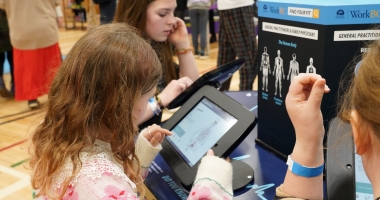Introduction
WorkBC has a collection of valuable resources to complement the important work that teachers and career counsellors already do in their classrooms, whether in person or online.
Introduce your students and other youth to these resources and help them:
- Explore WorkBC.ca career tools and resources.
- Research information related to their career interests and objectives.
- Identify and develop possible career paths.
- Set their own career goals.
- Explore post-secondary education options.
- Search job postings and prepare for a job application.
Career Education Resources
Visit Career Education Resources for lesson plans, learning activities, tools and resources to support teaching your career education class.
WorkBC’s Career Education Resources aligns the Ministry of Education’s career education curriculum along with feedback gathered from teachers and career counsellors across British Columbia.
All resources, lesson plans and worksheets are accessible, interactive, shareable (Facebook, Twitter, LinkedIn and email), downloadable (PDF or Word Document) and printable. Choose to complete a lesson plan, a specific activity, or just a worksheet.
It’s easy to find what you are looking for with a quick keyword search. Or filter the results by grade, career lifecycle stage, curricular competency or key audience. Check out the teaching tips, too. Remember to visit often or subscribe to our updates and receive an email when new lesson plans and resources become available.
Indigenous Peoples: career resources
Learn about the First Nations Education Steering Committee (FNESC) Career Journeys First Nations Career Role Model Program. FNESC supports elementary and secondary-level students who are starting to think about their career journeys. Program materials can be used by teachers, parents and youth and include video interviews with a variety of Indigenous role models, a teacher resource book, a parent and student guide, and classroom posters.
Check out the First Nations Education Steering Committee (FNESC) for other resources for Indigenous youth.
Consult the British Columbia Indigenous Skills Training Programs Inventory (PDF) for information about Indigenous-specific and general skills training programs and more. You’ll find provincial and federal government programs, as well as some offered by industry organizations and unions.
Additional resources
Find Your Path
Use the Find Your Path tool to explore career, education and skills training today.
Supporting the Transition to Post-Secondary Life
Do you have a student or youth approaching their first year of post-secondary studies? College or university may present students with a level of stress they haven’t previously encountered, at a time when they are on their own.
The guide From Surviving to Thriving: Developing Personal and Academic Resilience (PDF) provides resources, checklists, worksheets, a coping strategies planner and a choice of four strategies for managing stressful situations. It can help students plan to manage the stresses they may experience, so they can move beyond mere survival to thrive in their post-secondary life.
Find out more about the research, analysis and pilot program evaluation that underpin the guide.
Consider Co-operative Education
Co-operative education lets students integrate paid, relevant work experience with their program of study. Co-op programs are offered at most of B.C.’s public post-secondary institutions and are available across a range of program areas, including business, science, arts, applied science and technology.
Co-op education has many benefits for students:
- Gain paid, relevant work experience.
- Apply their classroom learning in the workplace.
- Develop practical workplace skills and learn to market their skills to employers.
- Build a valuable network of contacts and references of professionals in the field.
- Boost chances of landing a great job after graduation.
- Earn money to help with education costs.
To participate in a co-op program, students typically first apply to the post-secondary education institution for their program of study, then apply to the relevant co-op program.
Work terms are paid and generally start in January, May or September, and last for approximately four to eight months. Co-op students typically alternate study terms and work terms.
Visit the Association for Co-operative Education and Work-Integrated Learning, BC/Yukon (ACE-WIL) for more information and to search a list of available co-op programs.
Students can also contact their post-secondary education institution directly to get full program details, including how to apply, costs and the scheduling of work terms.
Skills Training for Employment Program
Do you know someone who needs support to overcome barriers to employment? Check out Skills Training for Employment (STE), with programs custom designed to help young adults and those at risk.
This program provides skills training and employment supports for people who face barriers to employment. Through the program’s tailored approach, participants are helped to work toward the goal of sustainable employment.










